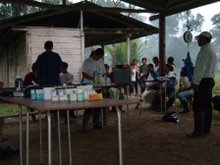
In the article"Globalization and Health Viewed From 3 Parts of the World," the author states that international institutions (e.g., UN, WHO, IMF) must re-examine their partnerships to eliminate private interests and to protect international equality.
Is this even possible? If so, how do we achieve it?
The idea of a global health bureau is not new. In fact, the first recorded series of global health meetings was held in 1851 (those of us in PM 566, the China class, are familiar with this). These "International Sanitary Conferences" provided a platform to discuss best practices to control the spread of disease during trade activities. It sounds like a noble goal, but in fact the motivation for seeking global participation was that in an emerging era of international trade, such collaboration was necessary to protect local health interests. 19th century colonialism and imperialism also provided considerable incentive to create global health solutions--Africa, Asia and the Caribbean were seen as exciting European discoveries. So while the Sanitary Conferences symbolized global cooperation, they were at least partially driven by ulterior motives and hegemonic relationships. Sound familiar?
Information is one of the greatest tools for development we have these days, and in terms of global cooperation, transparency is key. Whether the goal is controlling infectious disease, maximizing economic growth, or protecting global security, it is now imperative that information is shared on a global scale. This has not been done, and its effects are perilous (SARS in China, US foreign policy, former Soviet Union's Biopreparat, etc.) and long-lasting. However, enough nations have now united in pursuit of the MDG's to make transparency and accountability in foreign policy matters a logical and necessary next step. Until we, as nations and as international organizations, take that step, personal interest will cloud the proper flow and use of capital toward achieving the MDG's and any significant human development.
Just for reference, the article we were assigned to read in PM 566 is entitled, "International Efforts to Control Infections Diseases, 1851 to the Present" (JAMA, 2004).





2 comments:
Farah,
Thanks for your comments. Your blog is awesome.
I really like the use of this article, as you know it was one of my favorites as well. I think it's interesting that so many decades later the same problems still exists today as they did back then in terms of international cooperation in regards to public health. As the world becomes more "flat," let's hope that we can realize new successes in this area.
Farah hun your site is beautiful, I like your pictures. I really like your idea on that information is one of the greatest tools for development and it considers as a key in global communication. I think this is an important fact and via great contact tools such as Internet, TV, Satellit we are able to maximize industrial growth and international security. As we have discussed in most of our classes, being able to contact experts in different regions of the world will help us to over come emergency out breaks and situations such as SARS. I believe through public health threats, two most important tips are“Time” and being able to have a strong sense of” Leadership”, according to Dr, Calderons’s lecture. In this way we will be opening doors for minimizing the spread of diseases to different parts of the world. Remember that all we have discussed so far requires a team work and life long training ☺
Lets hope for this good day !
Post a Comment